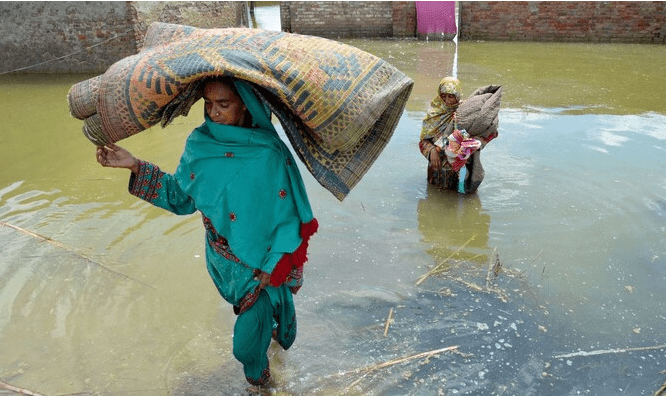Pakistan suggests establishing a regional climate data bank to support evidence-based catastrophe response.

Romina Khurshid Alam, Prime Minister Shehbaz Sharif’s coordinator on climate change, on Sunday proposed the establishment of a regional climate data bank to help Vulnerable Twenty (V20) group of countries prepare an evidence-based response to climate disasters.
The PM’s climate aide reaffirmed Pakistan’s commitment to boost regional collaboration among the V20 group, which represents 70 countries from the most climate-vulnerable regions, and pledged her all-out support to set up the V20 Climate Action Data Bank at a recent high-level meeting of V20 representatives, according to the Pakistani climate change ministry.
This centralized platform will aim to empower V20 nations to effectively cope with adverse fallouts of climate change by providing critical evidence-based information needed for informed decision-making and resource mobilization from available regional and international climate funding channels for the result-oriented climate actions through adaptation and mitigation efforts.
“Establishing the proposed data bank would be indeed a groundbreaking initiative to consolidate data on climate risks, economic losses and financial resilience-building needs of the V20 group member countries,” Alam said in a statement on Sunday.
Established in October 2015 in Lima, the V20 group is a coalition of finance ministers from countries highly susceptible to climate change impacts and aims to promote greater investment in climate resilience and low-emission development. As of October 2024, the V20 comprises 70 member countries from Africa, Asia, the Caribbean, Latin America and the Pacific, collectively representing over 1.7 billion people and account for just 5 percent share in the total heat-trapping global carbon emissions.
The V20 countries are disproportionately affected by climate change. Many of these nations grapple with rising sea levels, extreme weather events and rapid environmental degradation that threaten their economies, essential infrastructures, populations and livelihoods, according to the Pakistan PM’s climate aide.
Given the V20 countries’ heightened climate vulnerability, the new data bank is inevitable to enhance access to reliable data to strengthen climate resilience strategies and leverage international funding.
“By centralizing data and making it widely accessible for decision-makers, policymakers and planners, we can ensure that every dollar is well spent and every action is informed by the best available evidence,” she added.
Pakistan is recognized as one of the most vulnerable countries to climate change effects in the world and has seen erratic changes in its weather patterns which have led to frequent heat waves, untimely rains, cyclones and droughts in recent years. Scientists have blamed the events on human-driven climate change.
In 2022, unusually heavy rains triggered flash floods in the South Asian country, killing over 1,700 people and causing economic losses of around $30 billion.
By pooling data, Alam highlighted, the V20 members could engage in joint risk analysis, promote innovative financial mechanisms and coordinate responses to climate challenges more effectively.
“With this this new and crucial collaborative approach, the V20 countries can also strengthen collective resilience efforts, ensuring that countries can better prepare for and respond to climate impacts, ultimately fostering sustainable development,” she said.
“By enhancing risk management, timely informed decision-making and strengthening regional cooperation can also help attract investment and yield economic benefits.”






